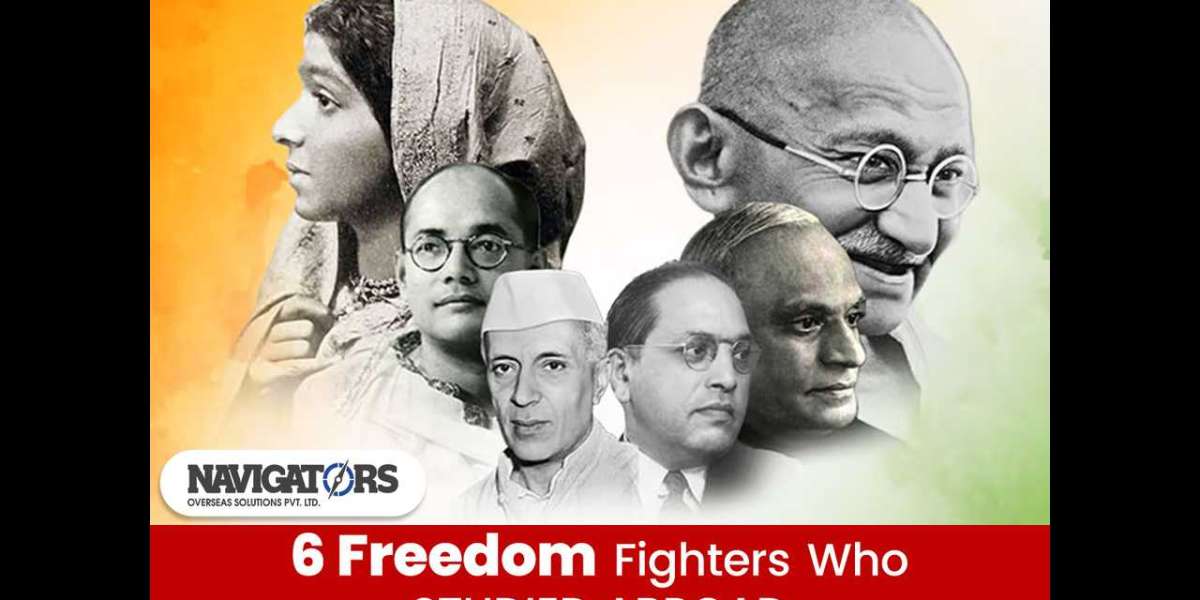How Overseas Education Shaped India’s Freedom Fighters
India’s independence movement is a testament to the courage, resilience, and sacrifice of countless leaders. While many of these leaders were deeply connected to India’s culture and heritage, a few chose to seek education abroad, bringing back perspectives that would prove crucial in shaping their ideologies and strategies. Their exposure to global ideas fueled their patriotism and provided them with tools to make impactful contributions to India's fight for freedom. Here’s a closer look at six remarkable freedom fighters who studied abroad and how their experiences influenced their roles in India’s independence struggle.
1. Mahatma Gandhi – The Father of the Nation
Education Abroad: Law at University College London
Mahatma Gandhi, known worldwide for his commitment to truth and non-violence, was one of the prominent freedom fighters who studied abroad. He pursued law in London, where he encountered various political and social philosophies that profoundly influenced his thinking. This exposure broadened his understanding of justice and civil rights, forming the foundation of his strategy of nonviolent civil disobedience. Gandhi’s philosophy became a cornerstone of the Indian independence movement, offering a unique approach to resisting British rule through peaceful protest.
2. Jawaharlal Nehru – The First Prime Minister of India
Education Abroad: Harrow School, Trinity College, Cambridge, and Inner Temple, London
Jawaharlal Nehru, a central figure in the independence movement and India’s first Prime Minister, received an extensive education in England. His time at institutions like Harrow, Cambridge, and the Inner Temple exposed him to liberal ideologies and a deep understanding of democratic governance. Nehru’s education equipped him with a modern outlook and a vision for an independent India that was democratic and secular. His experiences abroad fostered his appreciation for parliamentary democracy, which he later helped establish in India.
3. Subhas Chandra Bose – Leader of the Indian National Army
Education Abroad: Fitzwilliam College, Cambridge
Known as Netaji, Subhas Chandra Bose was a charismatic leader with a unique revolutionary approach to achieving India’s independence. While studying at Fitzwilliam College in Cambridge, Bose was exposed to a variety of political ideologies, particularly socialism and fascism. These influences shaped his belief in armed struggle as a means to attain freedom, setting him apart from leaders advocating peaceful negotiation. During World War II, Bose sought alliances with Axis powers and formed the Indian National Army to fight British rule by force, showing his commitment to a different path to independence.
4. Dr. B.R. Ambedkar – Architect of the Indian Constitution
Education Abroad: Columbia University, USA, and London School of Economics (LSE)
Dr. B.R. Ambedkar, a pioneering advocate for social justice and the principal architect of the Indian Constitution, was among the influential freedom fighters who studied abroad. He pursued advanced studies at Columbia University and the London School of Economics, which provided him with a robust understanding of law, economics, and political science. Ambedkar’s exposure to global ideas of liberty, equality, and fraternity became essential to his vision of an inclusive India. His studies abroad solidified his commitment to social justice and equality, central to his efforts in drafting the Indian Constitution and uplifting marginalized communities.
5. Sarojini Naidu – The Nightingale of India
Education Abroad: King’s College, London, and Girton College, Cambridge
Sarojini Naidu, admired for her poetic talent and oratory skills, was a significant figure in the freedom movement. She studied at King’s College and Girton College, where she encountered the women’s suffrage movement. Inspired by the advocacy for women’s rights, Naidu became a fervent supporter of women’s participation in India’s independence struggle. Her eloquence and leadership within the Indian National Congress made her an influential spokesperson, rallying support and inspiring people across the nation to join the fight for freedom.
6. Lala Lajpat Rai – The Lion of Punjab
Education Abroad: Law studies in Britain
Lala Lajpat Rai, a nationalist leader known for his fierce opposition to British rule, traveled to Britain to study law. Although his education exposed him to Western political thought, he returned to India with a renewed passion for preserving Indian cultural values. Rai believed that India’s strength lay in its rich heritage, and his leadership was marked by efforts to revive Indian pride. His dedication to resisting colonial influence and promoting traditional values made him an inspiring figure in the independence movement.
Conclusion
For these freedom fighters, studying abroad was more than just academic—it was a transformative experience that influenced their ideologies and strategies in the independence movement. By blending global perspectives with their love for India, they created innovative ways to challenge British rule. Their legacy illustrates that education, no matter where it is obtained, can be a powerful tool for social and political change. This article highlights the educational journeys of these six prominent leaders and their lasting impact on India’s fight for freedom.














